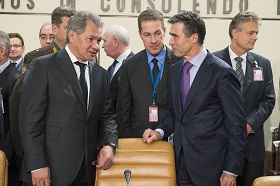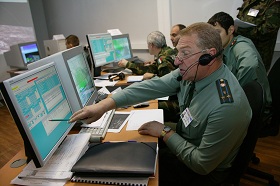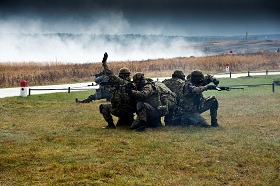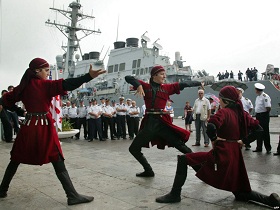65 Years of NATO: Lessons of the Past and a View of the Future
NATO Secretary General Anders Rasmussen
arrives in Afghanistan
In
Login if you are already registered
(no votes) |
(0 votes) |
PhD in Economics, Head of the European Security Department RAS Institute of Europe
April 4, 2014 marked the 65th anniversary of the North Atlantic Treaty Organization. Celebrating would have been inappropriate against the background of current developments in Ukraine, which NATO Secretary General Anders Fogh Rasmussen described as “the gravest threat to European security and stability since the end of the Cold War”.
History: Anniversaries and Crises
April 4, 2014 marked the 65th anniversary of the North Atlantic Treaty Organization. Celebrating would have been inappropriate against the background of current developments in Ukraine, which NATO Secretary General Anders Fogh Rasmussen described as “the gravest threat to European security and stability since the end of the Cold War”. However, NATO countries never intended to hold any celebration. The next NATO summit in Wales is scheduled for September 4-5, 2014, and this date was officially confirmed on November 15, 2013, before Euromaidan. Although the selection of the summit date is primarily determined by the Organization’s political agenda, NATO seemed unwilling to run the risk of gearing the leaders’ meeting toward the anniversary.
The last Anniversary Summit in Strasbourg-Kehl on April 3-4, 2009 was dedicated to the 60th anniversary of the Treaty and 10 years of Alliance’s eastward expansion. The Summit coincided with the anniversary of NATO's war against Yugoslavia, and was held amid intense social protest. On April 23-24, 1999 representatives of NATO states gathered in Washington to celebrate the Alliance’s 50th anniversary, welcome the entry of the first three Central European countries (Hungary, Poland and the Czech Republic) and adopt the New Strategic Concept. This happened exactly one month after Operation Allied Force in Yugoslavia and against the background of ongoing air strikes.
In response, Russia froze relations with NATO. They were restored three years later on May 28, 2002, when the Parties signed the joint Rome Declaration, establishing the NATO-Russia Council. However, the NRC failed to become an “all-weather” institution of equal partnership, as had been intended. In response to the Georgia crisis of August 2008, NATO froze relations with Moscow.
NATO’s restructuring aims to solve two fundamental problems how to preserve what has been achieved while reformatting the Alliance after the U.S. combat mission in Afghanistan is completed and how to do this against a backdrop of increased financial and resource constraints.
The “reset” in Russian-American relations provided a new opportunity to overcome the crisis “with added value of cooperation," which was enshrined in the decisions of the NATO and the NRC Lisbon Summit in November 2010. But even then doubts were voiced as to the consistency of the positive dynamics of Russia-NATO cooperation, and fears were expressed that the fundamental differences could lead to another, more profound, political crisis in the European security system. Unfortunately, these fears became a political reality just four years later.
NATO: Achievements and Future Plans
The Secretary General's Annual Report 2013 opens with a customary statement that “in an unpredictable world, NATO remains an essential source of stability” and that “NATO is now more effective and efficient than at any time in its history.” [1] Although the Report was published on January 27, 2014, it does not say a word about the crisis in Ukraine (the country itself is mentioned just twice, in the “Extending partnership networks” section). However, “the gravest threat to European security and stability” cannot but influence NATO policy, which is being shaped in line with the Strategic Concept adopted in Lisbon in 2010 but requires significant adjustment and adaptation to today’s new political realities.

Russian Minister of Defence Sergey Shoygu with
NATO Secretary General Anders Fogh
Rasmussen at NATO Defence Ministerial
meeting. October 2013
One of the key tasks at the NATO Lisbon Summit was to give relations with Russia a positive and constructive impetus, and the Lisbon NATO-Russia Council declared its aspiration to establish genuine strategic partnership. Having de-fused tensions on the Russian track, NATO could concentrate its efforts on other key areas identified in the Strategic Concept as “collective defense” and “crisis management.” NATO’s restructuring aims to solve two fundamental problems – first, how to preserve what has been achieved while reformatting the Alliance after the U.S. combat mission in Afghanistan is completed in 2014 and, second, how to do this against a backdrop of increased financial and resource constraints.
To improve combat capability, compatibility and complementarity, the Chicago Summit of May 20-21, 2012 endorsed a long-term plan of action “NATO Forces 2020.” Under it, two major initiatives were approved: Smart Defense (selecting and implementing priorities for military capability development on the basis of interstate specialization and coordinated defense procurement of NATO member countries) and Connected Forces (developing joint operations experience and interaction by optimizing training and combat training under NATO direction). In his Annual Report for 2013 the NATO Secretary General emphasized the significant progress made in these areas and the agreed plans for the future.
However, the Ukrainian crisis also forces NATO to adjust both its plans and goals. Solutions must be coordinated within a fairly short timeframe to be further submitted for consideration and approval at the summit in Wales in September 2014 that “will shape the future of the Alliance”. Speaking about the summit, Rasmussen noted: “We need to take tough decisions in view of the long-term strategic impact of Russia's aggression on our own security”. This position was endorsed by NATO Deputy Secretary General Alexander Vershbow, who said: “Now, of course, we have to assess the impact of events around Ukraine and possibly review our entire strategy”. However, there is little doubt that the political assessment of the Ukrainian crisis and its impact on future NATO transformation has already been made.
Si Vis Pacem, Para Bellum
Rasmussen and Obama stressed the Alliance’s strong commitment to strengthening collective defense. This means that NATO is returning to the concept of Russia’s containment and will develop its military plans and preparation accordingly.
During talks with U.S. President Barack Obama in Brussels on March 26, 2014 NATO Secretary General Anders Fogh Rasmussen said: “I welcome the steps that the United States has taken in response to Russia’s reckless and illegal military actions in Ukraine.” Rasmussen and Obama stressed the Alliance’s strong commitment to strengthening collective defense [2]. This means that NATO is returning to the concept of Russia’s containment and will develop its military plans and preparation accordingly. Many countries of the so-called New Europe, primarily Poland and the Baltic states, repeatedly insisted on strengthening NATO’s collective defense function. But at the Lisbon Summit in 2010, a pragmatic mood prevailed: “Today, the Euro-Atlantic area is at peace and the threat of a conventional attack against NATO territory is low,” although “the conventional threat cannot be ignored.” [3] Now NATO, is revising its military and political priorities, not to mention its military planning, in light of “Russia’s military aggression in Ukraine” and annexation of the Crimea.
The Wales Summit is likely to adopt a program of strengthening collective defense in Europe, primarily through the promotion of military training to reinforce the structure and logic of mutual deterrence. This will be the answer to Moscow’s fundamental question, recently discussed with NATO, namely the orientation of the Alliance’s operative activity after the Afghan drawdown. Previous proposals to promote military-technical cooperation, the scope of joint military exercises, etc. seem no longer relevant.
Strengthening transatlantic links, including the Wales agenda, remains NATO’s priority task. On the one hand, given the drift in U.S. interests toward the Asia-Pacific region, adequate U.S. participation must be ensured. On the other hand, there is a need to promote the European partners’ contribution to collective security and defense. The war in Libya demonstrated not only Europe’s inability to deal with such conflicts independently, without U.S. involvement, but also showed its failure to rise to the challenge of becoming an equal partner. The Europeans cannot hold the line on defense spending agreed by the allies, and devote at least 2 percent of Gross Domestic Product (GDP) to military expenditure (in 2013, only the United Kingdom and Greece met this 2 percent guideline). “The gaps in defense expenditures within the Alliance are growing. Between 2007 (taken as the pre-crisis baseline) and 2013, the share of U.S. expenditures has increased from 68 to 73 percent.” As a result, NATO is unable to provide “an equitable sharing of roles, risks and responsibilities.” [4]
What solution can there be to these problems against the background of the European security crisis? First, the crisis confirms and reinforces the mandatory nature of the “transatlantic linkage” and U.S. involvement in European affairs and defense. In his speech “Why NATO Matters to America” NATO Secretary General Anders Fogh Rasmussen said: “Developments in Ukraine are a stark reminder that security in Europe cannot be taken for granted. And that neither Europe, nor America, can come up with a solution alone.” This emphasis on collective defense also strengthens the role played by America’s military and political presence and guarantees in Europe. European missile defense is to become its pillar, based not on Russian concerns and the search for non-aggression guarantees, but on Euro-Atlantic security guarantees for which Russia is again a potential threat. Will NATO’s European component be boosted? Will the Europeans rise to meet these expectations?
Strengthening transatlantic links, including the Wales agenda, remains NATO’s priority task.
Politically – yes, but in reality little of any substance is likely to change. European countries are facing a grave financial and economic situation, and appeals to close ranks and strengthen security will not prompt them to allocate additional resources for collective defense. Moreover, substantial funds will be needed to support Ukraine, especially if the EU plans to sign an association agreement with it.
NATO has expressed serious concern over the Russian military buildup near the border with Ukraine and possible military invasion of the country’s south-eastern regions. Poland is anxious that “armed conflict ... could creep as far as its borders”. Even before the referendum in the Crimea on March 16, 2014, the North Atlantic Council, acting on a request from Poland, held consultations under Article 4 of the Washington Treaty regarding security concerns, and the allies re-stated their unity. According to Rasmussen, NATO has taken measures to strengthen its readiness. They include more assets for the Baltic Air Policing mission, surveillance flights over Poland and Romania, and heightened awareness.
On February 26, 2014 NATO Defense Ministers made a special Statement in support of Ukrainian sovereignty, independence, territorial integrity, and the inviolability of its borders, while Kiev urged NATO to consider using every available option to protect Ukraine. The NATO Secretary General reaffirmed the need and readiness to strengthen support for Ukraine by intensifying political and military cooperation with emphasis on:
- the “transformation of Ukrainian armed forces into modern and effective organizations, able to provide credible deterrence and defense against military threats
- enhancing the ability of the Ukrainian armed forces to work and operate together with armed forces of NATO Allies
- increased participation in NATO exercises.” [5]
Since these measures are enacted under the slogan “Defend Ukraine!” in response to Moscow's actions, they will only serve to aggravate today’s nascent confrontation, rather than de-escalate the conflict, which the West claims to be its purpose.
Promoting NATO military exercises with Ukraine while de-facto declaring Russia the aggressor inevitably exacerbates tensions both in the region and broader Russia-NATO relations. Although the new government in Kiev states that it has no intention to join NATO and NATO itself is not ready for this, the current context of rapprochement and an uptick in cooperation between NATO and Ukraine seem to contradict the stated goals of restoring Ukrainian unity. After all, it was the “Euro-Atlantic question” that split the country and Ukrainian society and ultimately can be said to have incited the events of Euromaidan.
The current geopolitical situation is fraught with the danger of NATO's further eastward expansion. That would represent a point of no return and the very real risk of a new military confrontation. On the other hand, the latter represents, perhaps, the most powerful deterrent for the West. In addition, uncertainty and instability in both Ukraine and Georgia make their membership prospects highly problematic.
The current context of rapprochement and an uptick in cooperation between NATO and Ukraine seem to contradict the stated goals of restoring Ukrainian unity.
Recent events in Ukraine may also lead to Moldova revising the neutral status enshrined in its Constitution and its orientation to join NATO. But for Chisinau that would mean following the Ukrainian scenario: ceding Transnistria (Transdniester), rupturing relations with Russia, and domestic political and economic destabilization. In other words, there seems little likelihood that these countries will be admitted to NATO, even against the background of the third (after Yugoslavia in 1999 and Georgia in 2008) crisis in Russian-NATO relations.
NATO-Russia: An Unclosed Door Policy
In the light of the Ukrainian crisis, even the “historic achievement” of the Lisbon Summit, i.e. ensuring Russia-NATO relations become those of a strategic partnership, could hardly be regarded as a genuine determination on the part of the Alliance. Rasmussen admits that Russia did nothing new: “Because this is not an isolated incident. It follows a pattern of behavior. Of military pressure and frozen conflicts in our neighborhood. Transnistria, South Ossetia, Abkhazia, and now Crimea. What connects those crises is one big country unilaterally deciding to rewrite international rules. Overnight, and on its own.”
NATO announced that, from now on, relations with Russia cannot be built in the same spirit. NATO has refrained from freezing relations with Russia and keeps the platform of the NRC platform for political dialogue. However, it is not clear what this means in practical terms. After all, NATO's position regarding the Ukrainian crisis and the fact that Russia will not revise its stand, eliminates any chance of reaching a compromise, even one that is purely technical. Russia has other partners and platforms for discussing ways to overcome the crisis and establish a direct dialogue with Kiev, which makes negotiations with NATO somewhat irrelevant.
As an immediate answer to Moscow, NATO Secretary General decided to suspend practical cooperation in the NATO-Russia Council. This measure was taken on the eve of the NATO foreign ministers’ meeting on April 1-2, 2014 to review the entire gamut of NATO-Russia cooperation. Some planned cooperation programs had already been canceled, including joint exercises and joint planning for a maritime escort mission for the destruction of Syria’s chemical weapons. Steps to curtail military cooperation with Russia have been undertaken by some NATO countries. France has warned Russia it could cancel the delivery of two Mistral-class amphibious assault ships, representing kind of a symbol of military-technical cooperation.
NATO has refrained from freezing relations with Russia and keeps the platform of the NRC platform for political dialogue. However, it is not clear what this means in practical terms.
On March 26, 2014 the Russian Government adopted a decision to transfer 4.1 million dollars to the NRC Helicopter Maintenance Trust Fund. This is a clear signal that Russia is ready to continue cooperation in certain spheres of mutual interest. For the time being, this pragmatic cooperation seems to be the most that the two sides can agree upon. If this is the case, then the door to the gradual development of practical cooperation remains ajar, provided that the current crisis is defused. Meanwhile, on April 1, 2014, NATO Foreign Ministers issued a Statement confirming their decision to suspend all practical civilian and military cooperation between NATO and Russia, while leaving the door open to political dialogue within the NRC. NATO’s relations with Russia are to be reviewed at the next NATO foreign ministers’ meeting in June. NATO countries insist that Russia must take immediate steps to de-escalate the conflict in compliance with the Statement of the NATO-Ukraine Commission of April 1, 2014.
However, the interpretation of Crimea’s accession to the Russian Federation as an illegal and illegitimate “annexation” which, according to the Statement of the NATO-Ukraine Commission, Russia must reverse remains the main obstacle to restoring even partial practical cooperation. This condition, along with other demands concerning “Russian behavior,” was put forward within the framework of NATO's decision to suspend cooperation. If NATO decides to drag out resumption of the NRC’s work, it may force Moscow to slam the door. That would mean that both sides will lose, especially in given the overriding issue of the security agenda, i.e. Afghanistan and the drawdown of U.S. and NATO combat contingents from the country by the end of 2014. NATO is well aware of this. Despite NATO's decision to suspend practical cooperation with Russia, NATO Secretary General Anders Fogh Rasmussen made it clear at his press conference on April 1, 2014, that cooperation on Afghanistan (counter-narcotics projects, transit arrangements, and the helicopter project) should continue, “because we have a joint interest in ensuring success of our mission in Afghanistan.”
Rasmussen is right to argue that a return to the previous relationship is impossible. The new paradigm of Russian-Western relations and the current crisis make resolving the latter with “added value” wishful thinking. Russia and NATO have exhausted this resource. The “reset” that resulted in another fundamental political conflict in Europe, leaves no chance for a new one. Both Russia and NATO now face a different, but no less urgent, problem – how to prevent the conflict from escalating into mutual confrontation.
The drift in Russia and NATO towards mutual deterrence presents a serious challenge for their non-European partners. It is already clear that many of them are not willing to accept the Western position and Russian answers. Afghanistan’s President Hamid Karzai, despite the obvious dependence on the U.S. and NATO and although the country is experiencing a particularly difficult transition period, recognized the results of the referendum in the Crimea. That is extremely significant.
How and on what political basis NATO (in line with its Strategic Concept 2010) will develop “a wide network of partner relationships with countries and organizations around the globe,” if political-military guidelines and operational priorities of the Alliance change dramatically? After all, irrespective of the extent of support the different partners offer NATO’s position, the crisis in its relations with Russia and the prospects of enhancing mutual deterrence alter the content and nature of these countries’ potential partnership with the Alliance, which presents itself as “28 of the world’s strongest, sovereign democracies”.
1. NATO Secretary General's Annual Report 2013, p.2.
2. NATO Secretary General and U.S. President stress commitment to collective defense / (http://www.nato.int/cps/en/natolive/news_108328.htm?selectedLocale=en)
3. Active Engagement, Modern Defense. Strategic Concept for the Defence and Security of the Members of the North Atlantic Treaty Organisation. Adopted by Heads of State and Government in Lisbon (http://www.nato.int/cps/en/natolive/official_texts_68580.htm).
4. NATO Secretary General's Annual Report 2013, pp. 19-20.
5. A strong NATO in a changed world. Speech by NATO Secretary General Anders Fogh Rasmussen at the ''Brussels Forum'', 21 Mar. 2014. (http://www.nato.int/cps/en/natolive/opinions_108215.htm?selectedLocale=en).
(no votes) |
(0 votes) |







